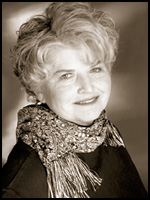  |
Issue 6 • Summer 2003 • Featured Lodestar Writer • Poetry

From Beginning to New Beginning: A Cycle of Poetry
Patricia Nell Warren
Introduction
In 1957, Patricia Nell Warren married writer Yuriy Tarnawsky, one of two million Western Ukrainian refugees who had emigrated to the U.S. after their homeland was occupied by Soviet Communist troops during World War II. Inspired by the beauty of the Ukrainian language, she learned it and began writing poetry in it.
From 1959 to 1973, Warren was a member of the New York Group, sharing in the publishing experience of a dozen young Ukrainian poets publishing in exile. The Group formed a co-op, bringing out their individual books as well as an annual poetry magazine, Novi Poezii. She published four books of poetry with the Group. The Group's work became widely known in Europe, through translations into German, Portuguese, Italian, Polish, Czech. Warren's work was even circulated underground in Soviet Ukraine itself, and eventually some of her poems were published there, in the country's leading literary magazine, during the late 1960s, when Ukraine began to liberalize and move towards the eventual fall of Communism. She writes:
Generally, the work in my four books of Ukrainian poetry reflects a load of pain and nihilism, a fascination with death -- a struggle to get into some other dimension that seemed more 'real.' It was my code language for coming out of the closet.
The 1950s to early 1970s were a period of my life when I was living a paradox: I was acutely aware that I had a "different" sense of sexuality and sexual orientation than most people. Yet I had chosen to try to fit into the pigeonhole that society offered me, both as a woman and a sexual being. So I got married and tried to be the standard hausfrau and career woman. This left my artistic sensibilities with the challenge of writing about an inner awareness that I knew I couldn't be open and honest about. I'd been over the ground of religious seeking and investigation -- Protestantism, Catholicism, Judaism, Islam -- so I knew that conservative traditions in all these religions condemn homosexuality. My attempt to hide left me in an artistic position that was essentially very compromised. After all, for the artist, sexuality isn't just a question of who you sleep with and love, but what you create. No wonder I was thinking about death -- I was living a kind of death! Everybody who spends many years in the closet lives through this paradox in some way, I think.
In my Ukrainian poetry I created highly personal, coded ways to talk about my real hidden awareness of myself -- hence the image in "Some Kind of Kasida," of the wind blowing sand away from the buried statue of a woman. Nobody but me knew what this poem was really about! But my body of poetry also has some political threads -- I was living among refugees from the communist system, and it was a time when the United States was on edge about war with the Soviet Union -- hence poems like "38," full of bombs and threat to life.
One important motif in this group of poems is lightning. Since childhood I was terrified but fascinated by lightning, and would run outdoors to see it whenever a storm blew up. To me, lightning is a powerful exercise of Earth's powers, as a great being who nurtures life. Lightning also symbolizes, to me, the power of the human mind and spirit to illuminate itself and see the unseen. A mysterious ability to attract lightning seems to run in certain families -- it does in mine. Both my father and my brother were hit by lightning and lived to tell the tale.
My turn finally came in 1976, three years after I came out. One stormy summer afternoon while working outside at my new home in Pawling, New York, the lightning found me and gave me that "kiss" that I mention in "Memoirs." I didn't suffer any major injury from this hair-raising experience, but ever since then, I've seen the Lightning not as something to fear, but as my Muse and spirit guide. "Memoirs" celebrates my new personal and artistic freedom. Not surprisingly, I stopped writing poetry and focused on novels -- stories of people who struggle to stay alive and meet their inner challenges. In their stories, I could still express my own.
Warren has written in more detail of her Ukrainian years in an article titled "A Tragedy of Bees: My Years as a Poet in Exile 1959-1973." It appears in the anthology The Best of The Harvard Gay & Lesbian Review, edited by Richard Schneider and published in 1997 by Temple University Press.
Poems
Untitled Poem
Case History
Anti-Season
Excerpt from "Some Kind Of Kasida"
The Matador's Prayer
Excerpts from "Minimal Poems"
Memoirs
 |
 |
Patricia Nell Warren has 40 years' experience in publishing. Starting in 1959 at The Reader's Digest, she rose to book editor, working with a number of prominent authors, till 1980. Her own author career started in 1971, with a first novel from Dial Press. She published bestsellers The Front Runner, Harlan's Race, and Billy's Boy. Today she is co-owner and co-founder, with author/publicist Tyler St. Mark, of Wildcat Press, an independent author imprint. She belongs to The Authors Guild, is active in the ad-hoc group working to launch a gay publishing association, and serves as consultant for a growing number of self-publishing authors.
|
 |

Go To:
Issue 6 or Lodestar Quarterly home page
|
 |

